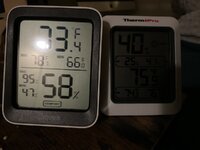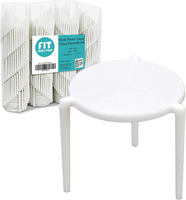It’s staying around 60-62% right now. When I run the AC, it lowers it to 51% or so. But it is starting to get too cold to run the AC. Opening the windows has a similar effect but I live in an apartment complex and smells start to come in from the neighbors so I have to close them. Oddly running the heat increases the humidity back to the ~60% level.
I live in AZ and currently the outside humidity is 35%. The average for Nov-Dec according to Google is 28-35%.
60% is on the high end of the ideal range, but indoor humidity typically normalizes with outdoor humidity unless the home is highly sealed (as in passivhaus standards) so the elevated levels may only be transient as the seasons change. I'm only belabouring this aspect because I don't like seeing people spend money on things that might not be necessary or which deal with transient issues.
That said, before investing in a dehumidifier, do you already run your bathroom and and kitchen vent hood when using those areas (and are they vented outside)? This could reduce the humidity at the source and eliminate the need for supplemental dehumidification. Closing the bathroom door and opening a bathroom window can also help.
Now, finally to your question

A condensing dehumidifier may contain concerning materials (you'd need to confirm with an individual manufacturer for the specific unit of interest), however by their nature they don't operate at high heat, so they're more akin to shopping for a refrigerator (which also has a condenser) than an oven. Risks, if any, would manifest during a failure state rather than during normal operation. As with any new appliance, I'd run it for a while in a separate air space until its "new" smell dissipates.
My experience with dehumidification was noise and heat (they add a bit of both to the environment they're in). Also think about how frequently you're able to monitor and empty the water that accumulates (there's a shutoff switch, but smaller units may need emptying throughout the day, vs larger units which may be once per day or less).
Finally, you could take a couple approaches if you buy one for your small space. Frist, buy one that's sized for your space and let it run on a moderate fan speed using its automatic sensor. Second, buy a larger capacity unit that you could run on its high setting while cooking and showering to quickly reduce humidity levels and keep it off at other times (such as when you're trying to sleep or working).



